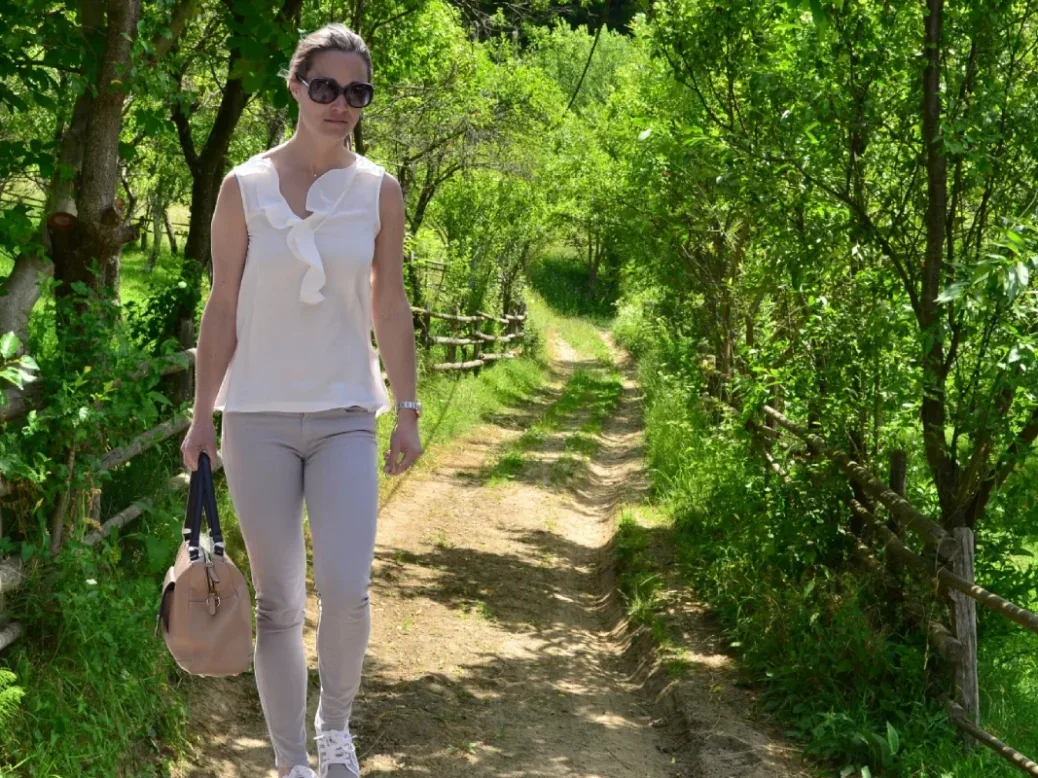
Pippa Middleton and her husband, James Matthews, are involved in a dispute with Kintbury, West Berkshire residents over the closure of a footpath on their £15 million 145-acre estate. The couple, who moved into the Georgian mansion two years ago, have erected signs stating ‘Private: No Public Access’ and ‘No Trespassing,’ restricting access to a path that villagers claim to have used for decades.
The estate’s previous owner, the late designer Sir Terence Conran, permitted residents to use the country lane leading to the property’s private drive.
In March 2024, Middleton’s husband Matthews, a former racing car driver, submitted a ‘Highway Declaration Notice’ to West Berkshire Council, delineating the private areas of their property and asserting that the road is not accessible to the public. In response, Eugene Futcher, chairman of the West Berkshire Ramblers, filed a ‘Definitive Map Modification Order’ to have the path recognised as a public right of way. The council is expected to decide in 2025; until then, the estate owners are permitted to enforce access restrictions.
[See also: Inside Necker Island: Richard Branson’s private retreat]
This dispute between Pippa Middleton and the public highlights the complexities surrounding land access and private property rights in rural England and has sparked a debate within the community. Some residents feel deprived of a longstanding amenity, while others support the couple’s right to privacy. The outcome of the council’s decision could set a precedent for similar cases in the future.
Legal experts explore whether the public should have access to private land and give best-practice guidance for landowners on safeguarding their property — often their most valuable asset.
Is the Pippa Middleton case simple cbecause it involves private land?
Not necessarily, Amy Cowdell and Esme Barker from law firm, Shakespeare Martineau. This situation is complex due to distinctions between permissive pathways and official public rights of way. Permissive pathways, while accessible to the public with the landowner’s permission, are not legally equivalent to public rights of way.
Adding to the complexity, public rights of way can be established if a pathway has been openly used by the public for 20 years without the landowner’s explicit consent. ‘Contrary to popular belief, permissive pathways are not legally viewed the same as a public right of way. However, members of the public are allowed to use them, providing they have the landowner’s permission to do so,’ they say.
There’s also the fact that public rights of way can be acquired by the public, which adds another dimension to the case, Cowdell and Barker say.
[See also: Sky-high wellness: private jets embrace the next frontier of luxury travel]
The government has also mandated that all unrecorded historic public rights of way (pre-1949) must be added to the Definitive Map of England by January 2031. This map will serve as the authoritative record of public rights of way across England and Wales. Landowners may face challenges adapting to potential changes in land use to accommodate newly recognised pathways.
‘This is a cause for concern for some landowners because it could result in them having to potentially change the way they use their land to accommodate permitted pathways,.’ say Cowdell and Barker.
Does public access over 50 years grant privileges?
It seems the public may have been accessing the land with the previous owner’s permissive rights, but, as Cowdell and Barker point out, ‘there are multiple factors that need to be considered’.
- Does the route appear on the historic pre-1949 map as a public right of way?
- Has the route been acquired through uninterrupted use by the public for over 20 years?
Evidence, such as photographs, is crucial in these cases. Additionally, the role of signage is significant.
‘Signage forms a significant part of the equation too. In these circumstances, the Ms Middleton and her husband have put up signs, asking people not to use the route, which is what we would regularly advise landowners to do,’ say Cowdell and Barker.
‘However, these signs are a recent addition, which is why any historic map recordings and the length of time the routes have reportedly been used by the public, play such a key role in determining overall access rights,’ they add.
Key considerations for landowners regarding access permissions
Landowners must avoid unintentionally granting public access to their land, as this could lead to disputes or even loss of exclusive control over pathways, our experts warn.
One effective tool is an application under Section 31(6) of the Highways Act 1980, allowing landowners to file a Landowner Deposit with the council. This stops the ’20-year clock’ for establishing public rights of way and requires the landowner to list all recognised public highways on their property.
[See also: The private island bringing sustainability to the BVI]
‘These deposits are really worth their weight in gold in helping prevent members of the public from roaming around on land, especially land where crops are being grown or livestock is being kept, posing wider health and safety and conservation protection risks that are challenging to manage.
‘Boundaries can easily become blurred, especially where large estates and historic ownership are concerned, but there are proactive measures landowners can, and should, take to define those boundaries and eradicate any confusion relating to how their land is accessed and used.’






